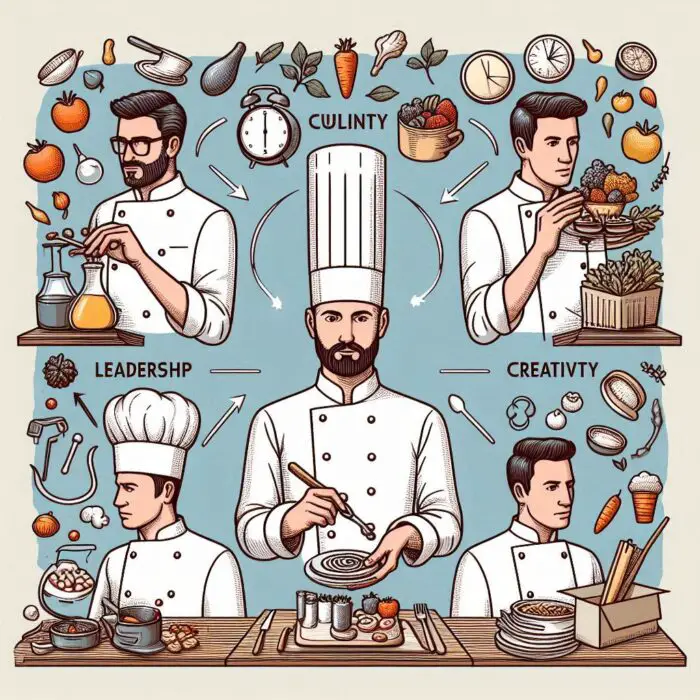
Introduction
Becoming an executive chef is a prestigious goal that many culinary professionals aspire to achieve. The position represents the pinnacle of a culinary career, combining creativity, leadership, and business acumen.
However, reaching this level requires more than just a passion for cooking; it demands a unique set of skills, experiences, and attributes.
In this article, we will explore the five key criteria for becoming an executive chef, providing insight into what it takes to lead a kitchen and manage a successful culinary team.
1. Extensive Culinary Education and Training
One of the foundational criteria for becoming an executive chef is having a strong educational background in culinary arts.
This often begins with formal training at a reputable culinary school, where aspiring chefs learn the fundamentals of cooking, food safety, and kitchen management.
A well-rounded culinary education provides the technical skills needed to excel in the kitchen and introduces chefs to a variety of cuisines and cooking techniques.
Many executive chefs also pursue additional certifications or specializations, such as pastry arts or sommelier training, to broaden their expertise and enhance their credentials.
2. Significant Experience in Various Kitchen Roles
Experience is crucial on the path to becoming an executive chef. Working in different kitchen roles, from line cook to sous chef, allows aspiring chefs to develop a deep understanding of kitchen operations.
This hands-on experience is invaluable for learning how to manage a kitchen, oversee staff, and ensure that every dish meets high standards of quality.
It also helps chefs build a repertoire of recipes, techniques, and problem-solving strategies that are essential for leading a culinary team. Typically, it takes years of experience working under seasoned chefs before one is ready to take on the responsibilities of an executive chef.
3. Strong Leadership and Management Skills
An executive chef is not just a master of cooking but also a leader who must manage a team of kitchen staff. Strong leadership and management skills are therefore essential for success in this role.
Executive chefs must be able to inspire and motivate their team, delegate tasks effectively, and maintain a positive work environment. They also need to handle the administrative aspects of running a kitchen, such as budgeting, inventory management, and scheduling.
Being an effective leader means balancing creativity with practicality, ensuring that the kitchen operates smoothly while consistently delivering high-quality dishes.
4. Creative Vision and Innovation
Creativity is at the heart of an executive chef’s role. The ability to design menus, create new dishes, and adapt to changing food trends is what sets a successful executive chef apart.
This requires not only a deep understanding of ingredients and cooking techniques but also a willingness to experiment and innovate.
Executive chefs must constantly push the boundaries of culinary art, finding new ways to delight diners and keep the restaurant’s offerings fresh and exciting. A strong creative vision is what drives a restaurant’s identity and helps it stand out in a competitive market.
5. Business Acumen and Financial Savvy
Running a successful kitchen is not just about cooking; it’s also about managing the business side of a restaurant. Executive chefs need to have strong business acumen, with an understanding of how to control costs, maximize profits, and ensure the financial health of the restaurant.
This involves everything from managing food costs and minimizing waste to negotiating with suppliers and pricing menu items appropriately.
Additionally, executive chefs must be able to adapt to market trends and make strategic decisions that support the restaurant’s long-term success. Financial savvy is a critical component of the role, as it ensures that the kitchen can operate efficiently and profitably.
Chart: Criteria for Becoming an Executive Chef
| Criteria | Why It Matters | How It Contributes to Success |
|---|---|---|
| Extensive Culinary Education and Training | Provides technical skills and foundational knowledge needed for culinary excellence. | Ensures chefs are well-prepared to lead a kitchen and create high-quality dishes. |
| Significant Experience in Various Kitchen Roles | Builds a deep understanding of kitchen operations and team dynamics. | Prepares chefs for the challenges of managing a kitchen and leading a culinary team. |
| Strong Leadership and Management Skills | Essential for inspiring and managing a team, as well as handling administrative tasks. | Ensures the kitchen operates smoothly and maintains high standards of quality. |
| Creative Vision and Innovation | Drives menu design, dish creation, and adaptation to food trends. | Helps the restaurant stand out and keeps offerings fresh and exciting for diners. |
| Business Acumen and Financial Savvy | Critical for controlling costs, maximizing profits, and ensuring the financial health of the restaurant. | Supports the long-term success and profitability of the kitchen and restaurant. |
FAQs
1. Do I need a formal culinary education to become an executive chef? While formal culinary education is highly beneficial and often preferred, some chefs reach the executive level through extensive experience and on-the-job training. However, a formal education provides a strong foundation in technical skills and culinary knowledge.
2. How long does it take to become an executive chef? The timeline varies depending on individual career paths, but it typically takes several years of experience in various kitchen roles, coupled with continuous learning and skill development, to reach the executive chef level.
3. What leadership qualities are important for an executive chef? Key leadership qualities include the ability to inspire and motivate a team, strong communication skills, effective delegation, and the ability to maintain a positive and productive work environment.
4. How important is creativity in the role of an executive chef? Creativity is crucial for menu development, dish creation, and keeping up with food trends. A strong creative vision helps the restaurant stand out and attracts customers seeking unique dining experiences.
5. What business skills do executive chefs need? Executive chefs need to understand cost control, budgeting, pricing, inventory management, and strategic decision-making to ensure the financial success of the kitchen and restaurant.
Conclusion
Becoming an executive chef is a challenging yet rewarding journey that requires a combination of education, experience, leadership, creativity, and business acumen. Those who aspire to this prestigious role must be committed to continuous learning and professional growth.
By meeting these five key criteria, aspiring chefs can position themselves for success and lead a culinary team with confidence.
As the culinary world continues to evolve, the role of the executive chef remains central to the success of any restaurant, making it a career worth pursuing for those with a passion for the art and science of cooking.
This article highlights the essential criteria for becoming an executive chef, emphasizing the importance of a well-rounded skill set that combines culinary expertise with leadership and business knowledge.
Author
-

Benedict Ohia is a seasoned chef with over 15 years of experience in the culinary industry. Passionate about food, innovation, and mentoring others, Benedict combines his chef expertise with his storytelling talent as the founder of CatererCareers.com. Through his niche website, he provides invaluable insights, tips, and resources for aspiring chefs, caterers, and hospitality professionals. Whether guiding career growth or sharing industry trends, Benedict is dedicated to inspiring others to succeed in the dynamic world of catering and culinary arts.
View all posts
